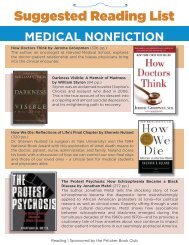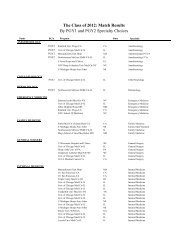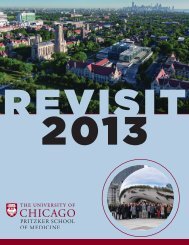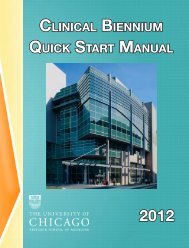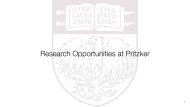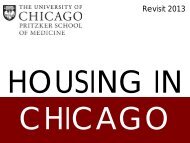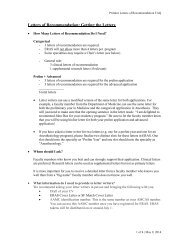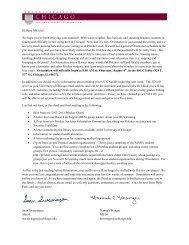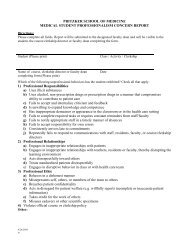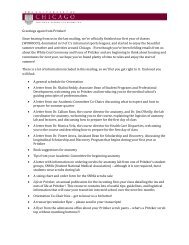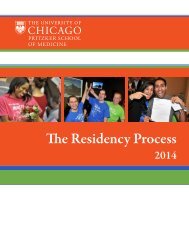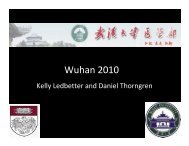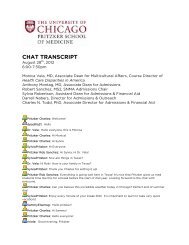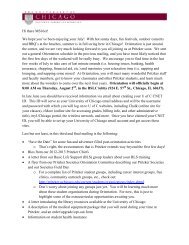students' international experiences here! - Pritzker School of Medicine
students' international experiences here! - Pritzker School of Medicine
students' international experiences here! - Pritzker School of Medicine
You also want an ePaper? Increase the reach of your titles
YUMPU automatically turns print PDFs into web optimized ePapers that Google loves.
Past International Program Experiences<br />
(compiled 04/04/2011)<br />
AFRICA<br />
Ghana<br />
Program: Self-directed program sponsored by an NIH/NHLBI grant through the Office <strong>of</strong><br />
Multicultural Affairs<br />
Contact: Richmond Darko (MS10, rdarko@uchicago.edu)<br />
“I conducted research at the University <strong>of</strong> Ghana medical school/ Noguchi Memorial Institute for<br />
Medical Research on the attitudes <strong>of</strong> medical students towards screening for sickle cell. “<br />
Ghana<br />
Program: Disaster Volunteers <strong>of</strong> Ghana<br />
Website: www.divog.org<br />
Contact: Aaron Cohn (MS11, ahcohn@uchicago.edu)<br />
“I volunteered in the community hospital, helping out with whatever needed to be done. That included<br />
taking blood pressures, reporting messages from doctors to nurses, shadowing, or simply holding a<br />
patient’s hand during delivery. I lived with a host family and walked from our village to the local clinic<br />
every day.”<br />
Contact: Julia Berian (MS11, jberian@uchicago.edu)<br />
“3-week hospital volunteering experience with homestay. Experience included shadowing in a number<br />
<strong>of</strong> departments in the local hospital, such as labor & delivery, surgery, pediatric ward, HIV/AIDS clinic,<br />
etc.”<br />
Rwanda<br />
Program: Women's Equity in Access to Care and Treatment (WE-ACTx)<br />
Contact: Zach Rosner (MS09, zrosner@uchicago.edu)<br />
“Between my first and second year <strong>of</strong> medical school I helped WE-ACTx start a family program that<br />
consisted <strong>of</strong> clinical care, support groups and a general survey <strong>of</strong> families to determine whether social<br />
needs such as food, clothing, school fees, etc. were being met. I also helped with WE-ACTx's research<br />
program and their Food/Income Generating Projects. WE-ACTx is generally overwhelmed with<br />
volunteers but if someone is interested in working with them let me know and I would be happy to<br />
help with contacting them.”<br />
1
South Africa (Cape Town)<br />
Program: Child Family Health International<br />
Contact: Jacky Kehler (MS10, jkehler@uchicago.edu)<br />
“I spent 4 weeks living with a family in the townships near Cape Town, South Africa. I spent most <strong>of</strong> my<br />
time working in four different parts <strong>of</strong> their public health care system (on an ambulance, at a primary<br />
care hospital, a tertiary hospital and in a community clinic).<br />
Tanzania<br />
Program: Volunteer for Global Service Corps<br />
http://www.globalservicecorps.org/<br />
Contact: Dan Thorngren MS13 (dthorngren@gmail.com)<br />
“I taught HIV education at a secondary school in Arusha, Tanzania.”<br />
Zambia (Lusaka)<br />
Program: Centre for Infectious Disease Research in Zambia<br />
Contact: Dan Krebs (MS10, dankrebs@gmail.com)<br />
“I worked as a research intern (about 75% <strong>of</strong> time in an <strong>of</strong>fice environment, 25% in the field). CIDRZ is<br />
the major vehicle by which the Zambian government is scaling up antiretroviral therapy; it is a joint<br />
venture between the Zambian Ministry <strong>of</strong> Health and the University <strong>of</strong> Alabama <strong>School</strong> <strong>of</strong> <strong>Medicine</strong>,<br />
and is funded mostly by PEPFAR. It serves about 50,000 patients nationwide. Opportunities exist for<br />
original research, direct interaction with patients and rounding at the university teaching hospital.<br />
Interns are placed in urban settings mostly the capital city.”<br />
ASIA<br />
China (Beijing)<br />
Program: Internship at the Chinese Center for Disease Control and Prevention (funded by Stanford<br />
University’s East Asian Studies)<br />
Contact: Nancy Wang (MS11, nwangy@gmail.com)<br />
“I analyzed blood samples from the first cohort <strong>of</strong> pediatric HIV/AIDS patients in China being treated<br />
with antiretrovirals for viral resistance one year after initiation <strong>of</strong> treatment. I worked in conjunction<br />
with Clinton Foundation in China to write reports summarizing findings and recommending policy<br />
changes.”<br />
2
China (Wuhan)<br />
Program: Volunteer for Wuhan University Medical Education Reform Project<br />
Contact: Dan Thorngren MS13 (dthorngren@gmail.com)<br />
As part <strong>of</strong> my Summer Research Program project, I went to Wuhan, China to assist with curriculum<br />
evaluation at Wuhan University Medical <strong>School</strong>.<br />
India (Hyderabad)<br />
Program: Summer Research Program<br />
Contact: Shravani Pasupneti (shravani@uchicago.edu)<br />
“I worked on a project measuring the acceptability <strong>of</strong> HIV prevention preferences <strong>of</strong> truck drivers in<br />
India. I spent afternoons working on that project and afternoons in a hospital interviewing patients<br />
about their knowledge about cardiovascular disease.”<br />
India (Hyderabad)<br />
Program: Summer Research<br />
Contact: Jonathan Dick (jonathan.j.dick@gmail.com)<br />
“I did a summer research program in Hyderabad examining the relationship between drug reps and<br />
doctors.”<br />
India (Hyderabad)<br />
Program: Geographical Medical Scholars Program (GMSP)<br />
Contact: Danielle Mianzo (MS10, dmianzo@uchicago.edu)<br />
“I had the opportunity to travel to Hyderabad, India for a month with several other students, residents,<br />
infectious disease and emergency department attendings. I learned through visitation about the<br />
structure and function <strong>of</strong> hospitals (private and government funded), leprosy rehabilitation homes, and<br />
vaccination outreach programs to local villages. I had the opportunity to visit continuing medical<br />
education conferences, medical schools, and resident training programs to see Indian medical training<br />
firsthand. Funding for airfare and vaccinations was granted by the GMSP program.”<br />
Contact: Josephine Kim (MS10, jsk@uchicago.edu)<br />
“I observed various medical sites including a rural hospital/medical school, government-sponsored<br />
hospitals, a rehabilitation home for leprosy patients and HIV+ children, and rural village programs for<br />
immunizing children, delivering prenatal care to pregnant women, and directly observing therapy for<br />
TB patients. We also attended medical conferences focused mainly on HIV transmission and therapies.<br />
The experience was a means <strong>of</strong> exposure to <strong>international</strong> medicine in resource-limited settings.”<br />
3
India (Jamkhed)<br />
Program: Comprehensive Rural Health Project<br />
Contact: Amy Romer (MS11, aromer@uchicago.edu)<br />
“I was the 2006-7 Mabelle Arole Memorial Fellow for the NGO the Comprehensive Rural Health Project<br />
(CRHP) in Jamkhed, India during the year between graduating from college and starting at <strong>Pritzker</strong>. In<br />
this year-long program, open to one student accepted to but deferring matriculation to medical school,<br />
I spent time in CRHP's rural hospital shadowing doctors, did an independent research project, learned<br />
about the organization's development activities, helped with fundraising, and took part in a diploma<br />
course on community-based health and development.”<br />
India (Kolkata)<br />
Program: Anjali Mental Health and Human Rights<br />
Website: www.anjalimentalhealth.org<br />
Contact: Laura Hodges (MS11, lehodges@uchicago.edu)<br />
“Anjali is a small NGO that focuses on advocacy and education for the human rights <strong>of</strong> people with<br />
mental illness. They also work in government-run mental hospitals in Kolkata to bring therapy and<br />
rehabilitation services to residents. Anjali has no formal “internship program,” so we basically created<br />
a position for me during my 10 weeks with them. I mainly worked in the <strong>of</strong>fice most days, w<strong>here</strong> I did<br />
things like conduct literature searches and create program literature. I also had the opportunity to visit<br />
our youth advocacy training programs as well as our programs in the mental hospitals.”<br />
India (New Delhi)<br />
Program: Unite For Sight<br />
Website: www.uniteforsight.org<br />
Contact: Jina Youn (MS11)<br />
“Unite For Sight Provides eye care worldwide and <strong>of</strong>fers service for free to those in need.”<br />
India (Vellore)<br />
Program: CMC Student Elective<br />
Website: www.cmch-vellore.edu/pages/ELECTIVE.htm<br />
Contact: Prerna Kumar (MS11, prerna@uchicago.edu)<br />
“The student elective program allows medical students from all over the world to work with physicians<br />
at CMC, which is one <strong>of</strong> the best hospitals in the country. Students get exposure to medicine in both<br />
the main hospital as well as in various affiliated, rural clinics and truly learn a tremendous amount<br />
about medicine while experiencing Indian culture first-hand.”<br />
Contact: Priyanka Kumar (MS11, priyanka@uchicago.edu)<br />
4
“Elective students are posted to clinical units/departments <strong>of</strong> their choice, ranging from General<br />
<strong>Medicine</strong> or Child Health in the main hospital, to rural clinics such as Community Health and<br />
Development (CHAD) and the Low Cost Effective Care Unit (LCECU). They participate in ward rounds,<br />
clinics, demonstrations, lectures, seminars, and community health education programs. Though<br />
students are unable to take part in direct, unsupervised patient care, involvement is very much selfdetermined.<br />
Thus, students can actively engage in a variety <strong>of</strong> <strong>experiences</strong>, from standing-in on<br />
cesarean sections, delivering basic ante-natal care to expectant mothers, measuring blood pressures,<br />
taking patient histories (provided that language is not a major barrier), and assisting in running health<br />
education programs.”<br />
EUROPE<br />
Program: FASPE<br />
Contact: William Parker MS12 (wparker@uchicago.edu)<br />
In the summer <strong>of</strong> 2010, Avrom Caplan (Class <strong>of</strong> 2013) and I (William Parker, Class <strong>of</strong> 2012) were lucky<br />
enough to participate in the Fellowship at Auschwitz for the Study <strong>of</strong> Pr<strong>of</strong>essional Ethics (FASPE)<br />
program for medical students. This intense two week experience took us from New York to Berlin to<br />
Auschwitz and Krakow, exploring the role <strong>of</strong> German physicians in the Holocaust as we travelled. The<br />
fellowship featured both historical study and active discussion <strong>of</strong> contemporary medical ethics, and the<br />
overall goal <strong>of</strong> the program was to both understand the role <strong>of</strong> medical pr<strong>of</strong>essionals in the Holocaust<br />
and use this understanding to frame the debate around modern ethical issues. The program was an<br />
incredibly powerful and rewarding experience, and provided me with a unique perspective entering<br />
third year that I hope to maintain throughout my medical career. Anyone interested in the FASPE<br />
program should refer to the program website, http://www.mjhnyc.org/faspe/programs.html. Avrom<br />
Caplan sums up my feelings about the program as he is quoted on the website "I feel so fortunate to<br />
have been selected for FASPE. The experience was incredible and will certainly inform my decisions<br />
and practices in my career and life.”<br />
France (Paris)<br />
Program: Research at the Salpetriere Hospital<br />
Contact: Celine Goetz, (MS11, cgoetz@uchicago.edu)<br />
“I worked at the Salpetriere Hospital in Paris in the Neurology Service (Centre de<br />
neuropsychologie et language) for six months earlier this year. I worked in both the center's clinic and<br />
with various research teams who were involved in dementia research and evaluation/treatment<br />
development.”<br />
Switzerland (Geneva)<br />
Program: Internship at the International Centre for Migration and Health<br />
Contact: Stephanie Albin (MS09, salbin@uchicago.edu)<br />
5
“I worked on health policy initiatives, particularly those pertaining to migrants' health and psychosocial<br />
wellbeing. The majority <strong>of</strong> my time was spent doing literature searches and compiling ‘best practices’<br />
guidelines.”<br />
LATIN AMERICA<br />
Belize (San Ignacio)<br />
Program: Cornerstone Foundation<br />
Contact: Laura Hodges (MS11, lehodges@gmail.com)<br />
“The program was called ‘Natural Healing.’ It was geared towards teaching people about the<br />
indigenous Mayan healing techniques still used in the area. Please talk to me for more details about<br />
Cornerstone before applying to work with them!”<br />
Chile<br />
Program: Self-Designed Public Health Elective with Universidad Andrés Bello in Santiago, Chile<br />
Contact: Anne Toledo MS13 (atoledo27@gmail.com)<br />
The summer following first year I lived in Santiago, working with a mentor from Universidad Andrés<br />
Bello to learn more about the Chilean health system and how it compares structurally to US health<br />
care. My mentor specialized in community health and our time ranged from one on<br />
one review <strong>of</strong> public health and policy, visits to health centers at all levels <strong>of</strong> care as well as interviews<br />
with health care providers which I independently scheduled outside <strong>of</strong> the mentored program. The<br />
purpose <strong>of</strong> the interviews was to supplement the formal review <strong>of</strong> public health with individual<br />
perceptions and opinions <strong>of</strong> the success <strong>of</strong> Chilean health reform and with the intention <strong>of</strong><br />
collaborating with UAB in the future.<br />
Costa Rica (San Jose) / Mexico (Tijuana)<br />
Program: Cross Cultural Solutions; Boy with a Ball; Healing Hearts Across Borders<br />
Contact: Eric Wagner (MS10, erwagner@uchicago.edu)<br />
“Last summer I went to San Jose, Costa Rica and worked in an HIV/AIDS and children's clinic. It was<br />
through a program called Cross Cultural Solutions. I volunteered at the clinic helping the nurses care<br />
for patients and went to hospitals assisting with patient interviews. I also worked with a program called<br />
Boy with a Ball to help homeless people and people working on the streets in San Jose, providing them<br />
with food and opportunities out into better living situations. I also go to Tijuana, Mexico a couple times<br />
every year to assist in clinics through a program called Healing Hearts Across Borders. Here I help to<br />
translate and interview patients. I really enjoyed both <strong>experiences</strong> and would do both again.”<br />
Costa Rica / Nicaragua<br />
Program: International Service Learning<br />
Contact: Josh Wallbrecht (jlw@uchicago.edu)<br />
6
“We set up and helped with clinics in poor neighborhoods in Costa Rica and Nicaragua.”<br />
Dominican Republic<br />
Program: Remedy (http://remedyuchicago.org/frames.html)<br />
Contact: Martin Anderson, (MS10, meanders@uchicago.edu)<br />
“We traveled to the Dominican Republic to gain medical experience, and to provide medical aid in the<br />
form <strong>of</strong> manual assistance and supplies.”<br />
Contact: John Paro (MS10, jparo@uchicagoedu)<br />
“In particular, one week I visited and toured Hospitals and clinics in an Urban setting (San Domino, the<br />
capital.) The second week, we visited the small shanty towns set up around sugar fields and did some<br />
community building exercises.”<br />
Dominican Republic<br />
Program: Young Adult Service Corps<br />
Contact: Andrew Phillips (MS11, warejko@uchicago.edu)<br />
“I lived in the Dominican Republic last year through a program called the Young Adult Service Corps (a<br />
lot like Peace Corps). I taught English and science labs, and volunteered at a public hospital emergency<br />
department. I’d be happy to answer any questions anyone may have about the DR or taking a year <strong>of</strong>f<br />
to do work like that.”<br />
Equador (Quito)<br />
Program: Child and Family Health International<br />
Contact: Jasmine C. Dowell, (MS11, jchristell@uchicago.edu)<br />
“We rotated through various hospitals and clinics, public and private, assisting w<strong>here</strong> we were capable.<br />
We spent two weeks going to locations in the main city, Quito, and 2 weeks in a very rural area on the<br />
coast called Chone. We had Spanish lessons each day, free weekends to tour the country, and we lived<br />
with host families.”<br />
Haiti (Cyvadier)<br />
Program: Friends <strong>of</strong> the Children <strong>of</strong> Haiti<br />
Website: www.fotcoh.org<br />
Contact: Ann DeBord Smith (MS09, annsmith@uchicago.edu)<br />
7
“I worked with providers on patient care (patient interview, assessment, and plan), in the pharmacy<br />
filling prescriptions, and at triage taking blood pressures and ordering labs.”<br />
Contact: Tanvi Patel, (MS10, tanvi@uchicago.edu)<br />
“I triaged patients, worked side-by-side with FOTCOH doctors to provide care, and helped in the<br />
pharmacy.”<br />
Contact: Joshua Williams, (MS11, joshuawilliams@uchicago.edu)<br />
“This is a two week long, medical mission trip, to a clinic in southern Haiti. Teams <strong>of</strong> approximately 20<br />
medical personnel from across the US staff the clinic five times a year. You work alternately each day<br />
alongside a pharmacist or a physician. Each clinic day is about 8-9 hours <strong>of</strong> work and most days <strong>of</strong> the<br />
trip are work days. The program gives you an incredible amount <strong>of</strong> medical educational exposure<br />
considering the number <strong>of</strong> patients you see and the types <strong>of</strong> conditions. The doctors on our team were<br />
very eager to teach and make sure we were able to see as much as possible.”<br />
Contact: Nathan Cardoos, (MS11, ncardoos@uchicago.edu)<br />
“Friends <strong>of</strong> the Children <strong>of</strong> Haiti is an all-volunteer, non-pr<strong>of</strong>it, Christian-based organization that runs<br />
six ~two-week medical missions per year, treating Haitians <strong>of</strong> all ages. The FOTCOH clinic is located in<br />
Cyvadier, Haiti, approximately 5 miles east <strong>of</strong> Jacmel. As a medical student volunteer, I had the<br />
opportunity to work in the clinic for 10 full days, alternately shadowing an attending and working in<br />
the pharmacy. T<strong>here</strong> were 23 volunteers on our trip and we treated 2,226 patients.”<br />
Haiti (Thiotte)<br />
Program: Haiti Medical Mission <strong>of</strong> Wisconsin (http://haitimedicalmission.com/)<br />
Contact: Gina DeGiovanni (gdegiova@uchicago.edu)<br />
“I assisted a surgeon in the OR as first-assistant, primarily on hernia, hydrocoele, breast biopsies,<br />
lypomas and gyne cases, including deliveries and c-sections. I also worked basic triage and initial H&P's<br />
with the help <strong>of</strong> a Haitian translator.”<br />
Nicaragua (Managua)<br />
Program: Atencion Primaria en Salud (APS) (http://www.apsnicaragua.org/)<br />
Contact: Rachel Gilbert (MS10, regilbert@uchicago.edu)<br />
“For 10 weeks, I helped to train and evaluate about 45 community health workers (15 in Managua, the<br />
capital, and 30 in a very rural area) using the program's guides and training program as my own guide.<br />
To do this, I planned my own schedule and found my own transportation. I stayed in the houses <strong>of</strong><br />
these community health workers in the rural areas and in the house <strong>of</strong> the program director in<br />
Managua. I was also able to observe in this program’s clinic in Managua, in some <strong>of</strong> the public<br />
health system hospitals and health centers, and in the clinic <strong>of</strong> a doctor in the private health care<br />
system. I also traveled with both the private and public doctors into the rural areas to hold consults<br />
8
t<strong>here</strong>, and I helped out during the medical consults given by the community health workers. This was a<br />
very interesting summer, but I do have some strong critiques <strong>of</strong> the program, so if you<br />
are considering applying, please contact me first.”<br />
Nicaragua (Managua)<br />
Program: Sustainable Sciences Institute (an NGO) Intern<br />
Contact: Katherine Hekman (MS10, keh@uchicago.edu.)<br />
“I shadowed SSI physicians and government-employed laboratory technicians in one <strong>of</strong> the Ministry <strong>of</strong><br />
Health’s local centers, w<strong>here</strong> they provide free health services and laboratory diagnostic techniques for<br />
free to the public. I also shadowed SSI physicians in the Infectious Disease ward <strong>of</strong> the main pediatric<br />
hospital (Hospital Infantil Manuel de Jesus-Rivera).”<br />
Panama (Kuna Yala)<br />
Program: Centro de Salud, Rio Sidra<br />
Contact: Nicole Baltrushes (MS11, nbaltrushes@uchicago.edu)<br />
“First <strong>of</strong>f, I wouldn’t exactly call my trip a “program.” It was not an organized established exchange, but<br />
something that I worked out myself with a government clinic in Panama. I traveled to a small island <strong>of</strong>f<br />
the coast <strong>of</strong> Panama and worked/shadowed at the tiny health clinic on the island every weekday for<br />
one month. Every morning I worked with the doctor as he interviewed, examined and prescribed<br />
treatment for patients. In the afternoons I would help with clerical/ bureaucratic work. The clinic was<br />
very small but at all times we had at least one doctor and one nurse, a pharmacy assistant and an<br />
<strong>of</strong>fice manager <strong>of</strong> sorts.”<br />
Peru (Cusco)<br />
Program: REMEDY<br />
Contact: Katie Raffels MS13 (katie.e.raffel@gmail.com)<br />
Through the REMEDY program at <strong>Pritzker</strong>, I got the opportunity to spend two weeks in Cusco, Peru<br />
working with the organization CerviCusco whose goal is "to reduce the morbidity and mortality <strong>of</strong><br />
cervical neoplasia in Peruvian women by providing a culturally sensitive, comprehensive cervical cancer<br />
prevention program." I had the opportunity to perform breast exams and pelvic exams both at the<br />
clinic and in the rural communities <strong>of</strong> the Andes. This opportunity also allowed me to experience a rich<br />
and beautiful Peruvian culture while learning about the movement toward cervical cancer prevention<br />
in that country.<br />
Peru (Huancayo)<br />
Program: Mosoq Ayllu<br />
Website: www.mosoq-ayllu.org.pe<br />
9
Contact: Laura Kaplan (MS11, lkaplan11@uchicago.edu)<br />
“Mosoq Ayllu is a small non-pr<strong>of</strong>it run by Juan Jose Montoya and Patti Guardamino, a Peruvian couple<br />
in their late thirties. Mosoq Ayllu is most accurately described as a loose and flexible placement<br />
program that has contacts with a variety <strong>of</strong> organizations that need assistance in Huancayo. I<br />
volunteered at four <strong>of</strong> the sites: a small non-pr<strong>of</strong>it medical clinic, a senior citizens home, a mobile<br />
ambulance, and a safe place program for children. They also have contacts with an orphanage, young<br />
mother’s program, English teaching institute, and a bigger medical clinic in a small city nearby. In the<br />
spring and summer (the peak period) t<strong>here</strong> are usually 8-10 other volunteers from around the world<br />
volunteering with the program at a given time.”<br />
Peru (Lima)<br />
Program: International Federation <strong>of</strong> Medical Students Association, Limakids<br />
Website: www.ifmsa.org, www.limakids.org<br />
Contact: Roy Tomas DaVee (MS09, davee@uchicago.edu)<br />
“In Lima, t<strong>here</strong> is a significant population <strong>of</strong> homeless and orphaned children. These kids once lived<br />
completely alone, running in gangs, living under the bridges, eating garbage and growing without adult<br />
support or supervision, <strong>of</strong>ten abusing drugs and becoming involved in crime and prostitution. LimaKids<br />
is a social welfare program designed to provide free health care, fun activities and mentoring to these<br />
high-risk young people, many <strong>of</strong> whom are already parents themselves. I began assisting the attending<br />
physicians, in the LimaKids Clinic when they held their weekly appointments. Also, I began volunteering<br />
in their associated tutoring and mentoring program called “Leave the Streets” one to two days per<br />
week. Additionally, I organized rotations through the International Federation <strong>of</strong> Medical Students<br />
Association and Cayetano University to participate in 3 one-month long clerkships in various Ministry<br />
<strong>of</strong> Health Hospitals in Lima. I did Infectious Diseases, Ob-Gyn and Medical ENT rotations. Which not<br />
only allowed me to assist a greatly underserved population but I also was treat like an intern and given<br />
some patients and responsibilities that allowed me to learn a lot and take charge <strong>of</strong> my patients care.”<br />
Peru (Sacred Valley, around Cusco)<br />
Program: ProPeru (http://www.myproworld.org/)<br />
Contact: Elaine Lin (MS10, line@uchicago.edu)<br />
“I worked with members <strong>of</strong> the Ministry <strong>of</strong> Health - volunteering in the clinic, creating health<br />
campaigns, shadowing physicians. A lot <strong>of</strong> my work revolved around traveling to villages to teach about<br />
hygiene and pass out supplies.”<br />
10



